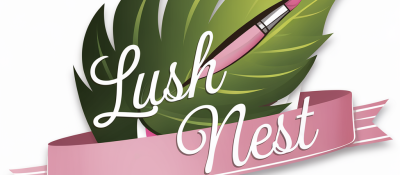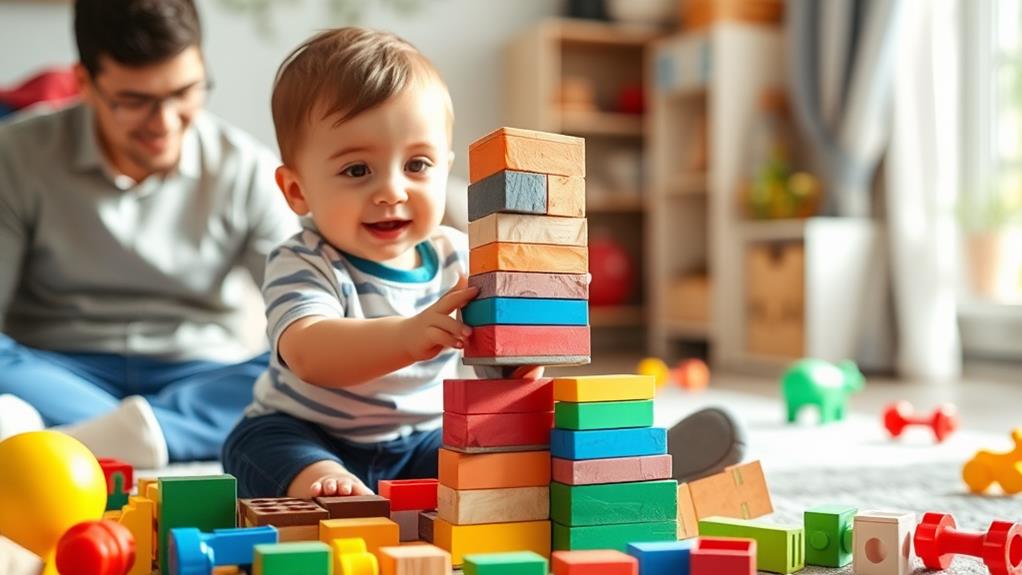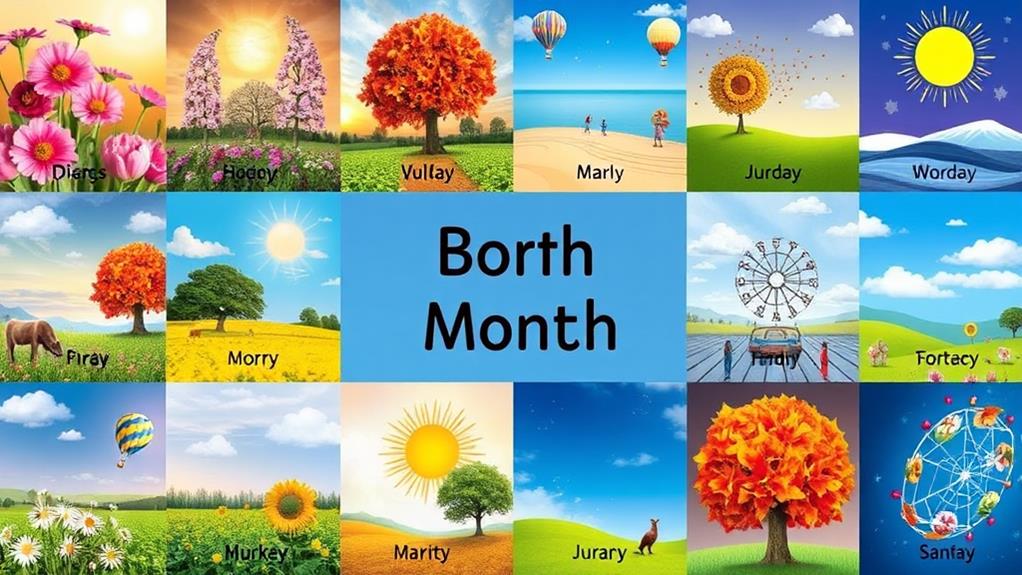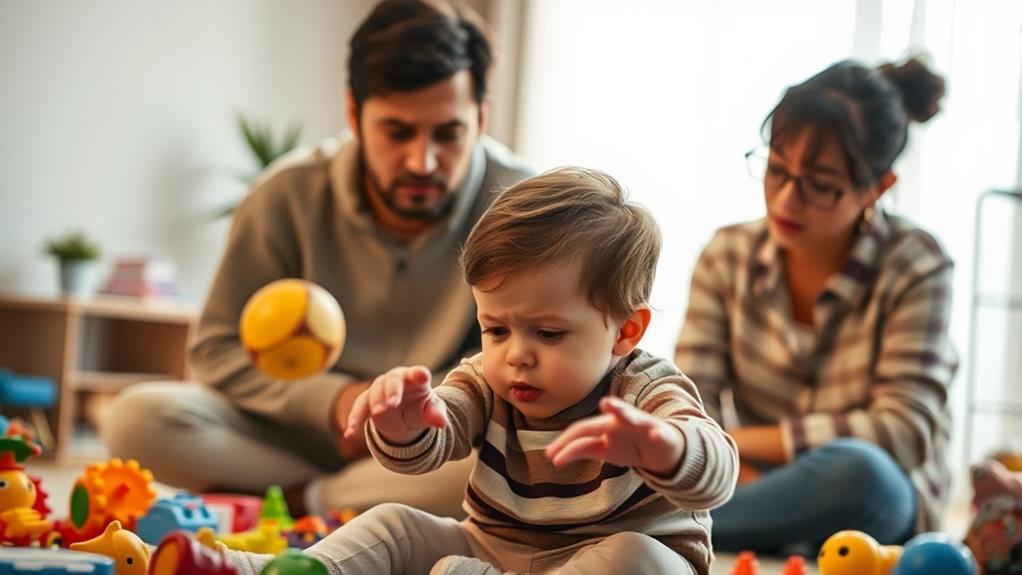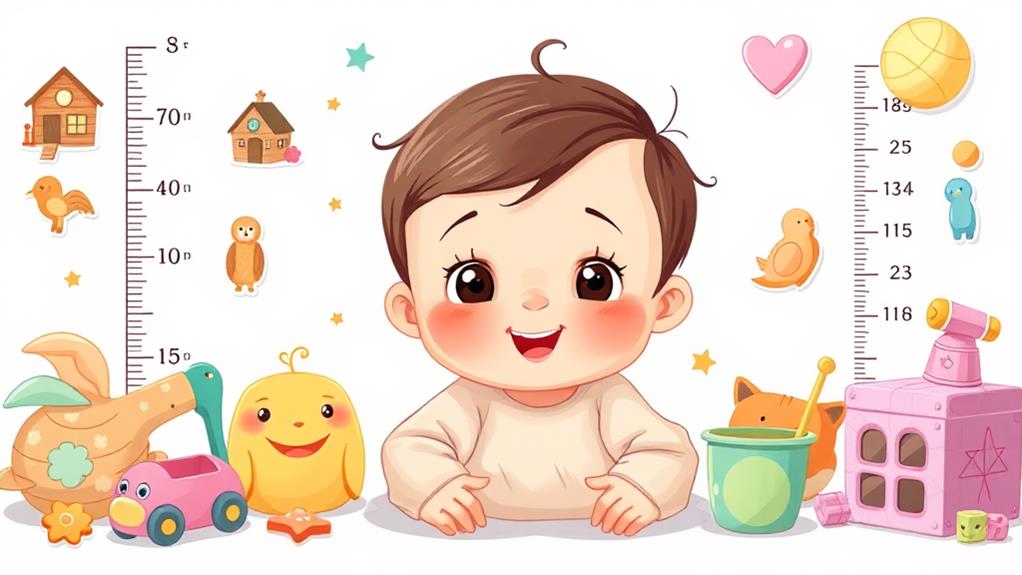As your toddler approaches the 25 to 27-month mark, you'll notice some remarkable changes in their development that can shape their future growth. At this stage, they're likely expanding their vocabulary and beginning to express themselves in two-word phrases, while also honing their physical abilities, like climbing and jumping. Socially, they're starting to form preferences and engage with peers in new ways. Understanding these milestones can help you support their journey effectively. What specific challenges or surprises might you encounter during this exciting phase?
Overview of Developmental Changes
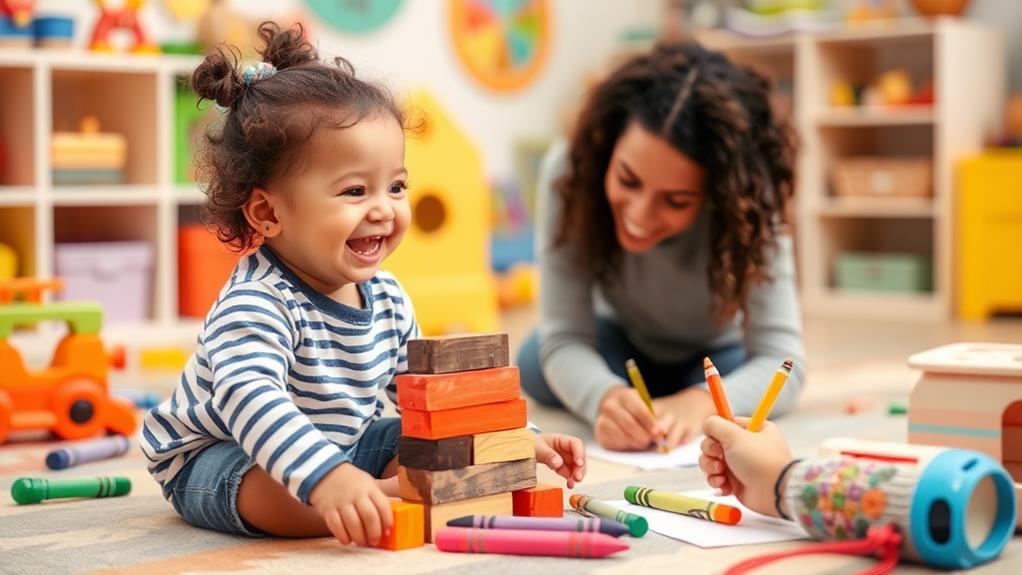
During the toddler years, significant developmental changes unfold, shaping your child's growth and interactions. From 25 to 27 months, your little one reaches important developmental milestones, especially in language development. You might notice that they're using more words and gestures to express their feelings and needs.
It's an exciting time, as they start to prefer routines during playtime and mealtime, showing a little resistance to changes.
Toilet training readiness often pops up around this age, too. Your toddler might also form strong attachments to toys, becoming a bit self-centered. But don't worry; this phase is totally normal!
You might catch glimpses of empathy as your child comforts others, though they'll still struggle with emotional regulation, leading to those classic mood swings and temper tantrums.
Laughter and giggles will fill the air, signaling their growing social and emotional skills. As they respond better to humor, you can enjoy light-hearted moments together.
This blend of language development, emotional growth, and social skills makes this stage a whirlwind of changes. Cherish these moments; they're just the beginning of a lifelong adventure in learning!
Motor and Physical Skills
By 27 months, your toddler's physical and motor skills are blossoming, setting the stage for more adventurous play. You might notice that their gross motor skills have improved significantly. They can walk up and down stairs, placing both feet on each step, and even show off some jumping skills.
Walking on tiptoes is also a fun activity for them, showcasing their growing balance and coordination.
On the fine motor skills side, your little one is getting quite adept at handling small objects. They can turn pages in a book and tackle simple puzzles, which is pretty impressive!
Their grip on a pencil is developing too; they can hold it using their thumb and forefinger, making those early scribbles a bit more intentional.
And let's not forget about the everyday tasks! Your toddler can use a straw for drinking and can zip and unzip their clothes independently—talk about gaining some self-reliance!
Watching your child master these skills can be both exciting and a little bittersweet, as it means they're growing up fast. Embrace these moments; they're just the beginning of a wonderful journey!
Speech and Language Growth
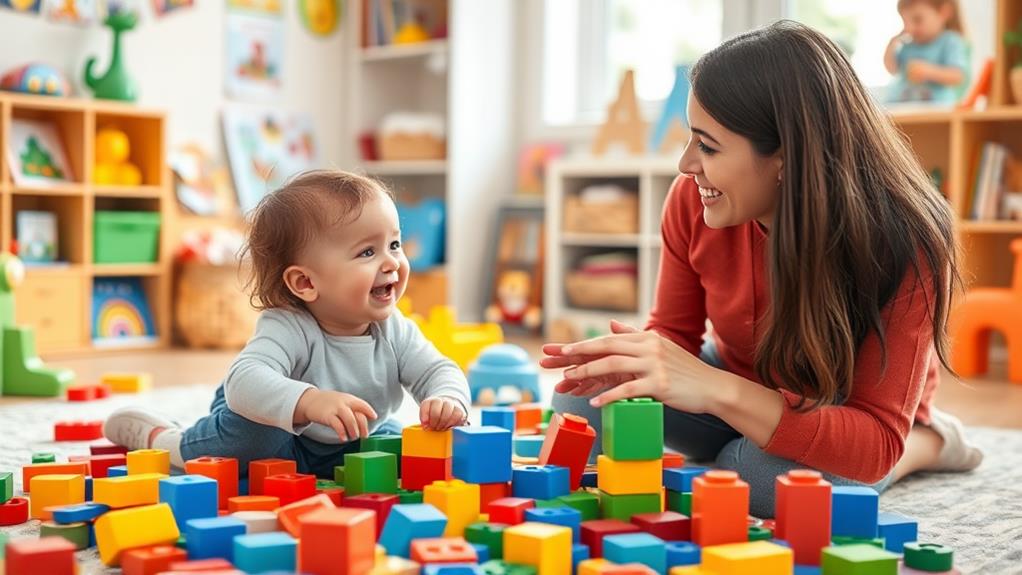
At 27 months, your toddler's speech and language growth is truly remarkable. By this age, they likely have a vocabulary of about 300 words and can use two-word sentences to express their needs, like saying, "more juice" or "big truck."
It's exciting to see them following simple directions, too, like "come here" or "give me the ball," with growing accuracy.
You can really help your child during this time by engaging in daily conversations and reading together. The more you talk, the more words they'll learn—sometimes several new words a day!
Don't forget to incorporate fun activities like short poems and rhymes; they can significantly boost language skills and vocabulary, making learning enjoyable.
You might also notice your toddler starting to refer to themselves by name and using pronouns like "me" and "mine." This shows they're beginning to understand self-identity and ownership.
Encouraging this growth can be as simple as repeating words back to them or celebrating their attempts at speech. So, enjoy this lively stage, and remember, every conversation counts!
Social and Emotional Development
Social and emotional development takes a significant leap between 25 and 27 months, as toddlers increasingly seek independence and start to assert their individuality. You might notice your little one wanting to do things on their own, like putting on shoes or choosing toys, without asking for help. This newfound independence is exciting, but it can also lead to some adorable tantrums when things don't go their way!
During this stage, emotional understanding really begins to blossom. Your toddler may notice when someone is hurt or upset, often stopping to look concerned or even sad themselves. It's heartwarming to see that empathy starting to form.
Plus, they'll likely start engaging in parallel play, which means they'll play alongside other kids, even if they're not directly interacting just yet.
As they navigate these social relationships, you'll see them develop preferences for certain people and toys, showing their growing attachments.
Eating Habits and Preferences
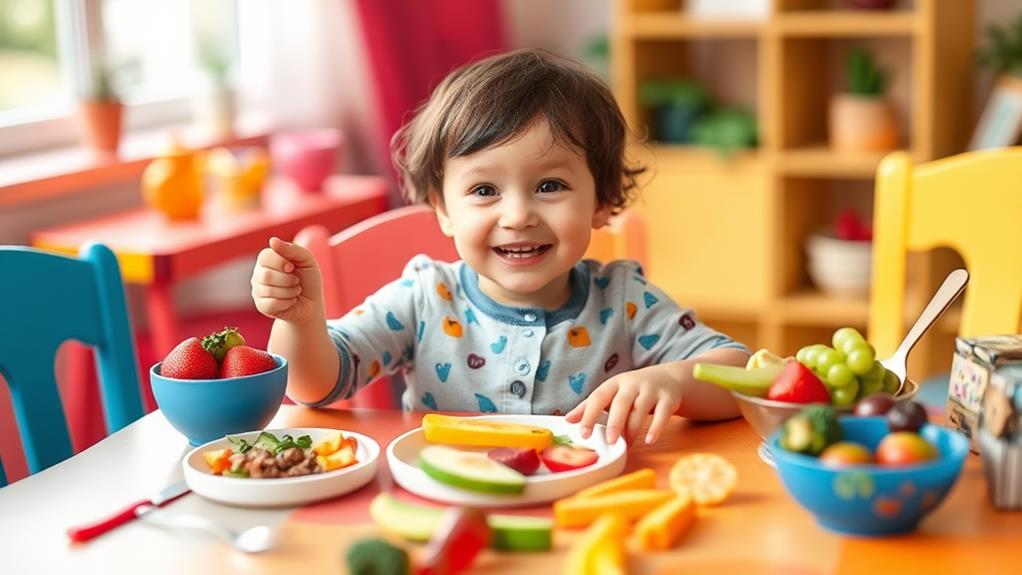
As toddlers begin to assert their independence, you'll notice this same drive reflected in their eating habits and preferences. At this age, they often stick to familiar foods, showing limited interest in trying something new. It can be a bit frustrating, but don't worry; it's perfectly normal!
You might find that presenting food in fun and creative ways can inspire your child to give new dishes a chance. Think colorful plates or silly shapes!
Remember, your eating habits play a big role in shaping their preferences. If they see you enjoying a variety of foods, they're more likely to want to join in. Also, serving small portions is a great way to gauge their hunger without overwhelming them. After all, a plate piled high can be a bit daunting!
As your toddler develops, they'll start to distinguish between finger foods and spoon foods, which is a sign they're gaining independence in self-feeding. This is a wonderful time for them to learn about different textures and flavors.
Practical Life Skills
Many toddlers around 25-27 months start to grasp practical life skills that enhance their independence. At this age, your little one might surprise you by washing their hands all by themselves, following the basic steps without too much fuss.
Engaging them in simple household tasks, like sorting laundry or putting away toys, can really boost their self-reliance. Plus, it's a great way to keep them busy while you take a breather!
You might notice they can hold and use a spoon effectively, even if there's some spilling—hey, it's all part of the fun! Encouraging your toddler to help stir ingredients during meal prep gives them a sense of responsibility and makes mealtime a team effort.
Activities like color-matching games can also work wonders for their attention span, promoting sorting skills that lay the groundwork for practical life skills.
Resources and Community Support
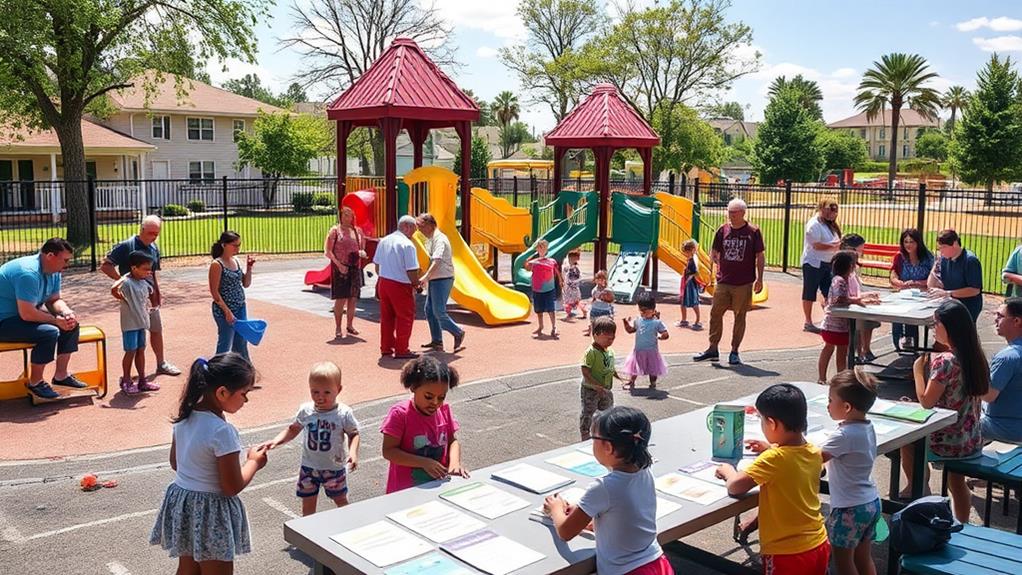
Navigating the world of toddler development can feel overwhelming, but there are plenty of resources and community support options available to help you along the way.
For starters, infographics are fantastic visual aids for tracking your toddler's developmental milestones. These colorful charts can make it easier to see how your little one is growing.
You'll also find articles and videos that offer great insights into language development, which can really help you support your toddler's speech skills.
Don't forget about parenting forums! They're excellent for connecting with other families, sharing experiences, and swapping advice. It's like a virtual coffee chat, but with a lot more toddler talk!
If you're ever concerned about your child's development, expert references like pediatricians and child development specialists can provide invaluable guidance.
Plus, the Early Development Network is a fantastic resource for families worried about early development. They emphasize early intervention, which can be a game-changer for your toddler.
With all these resources and community support options, you'll have the tools you need to help your child thrive and enjoy this exciting stage of growth!
